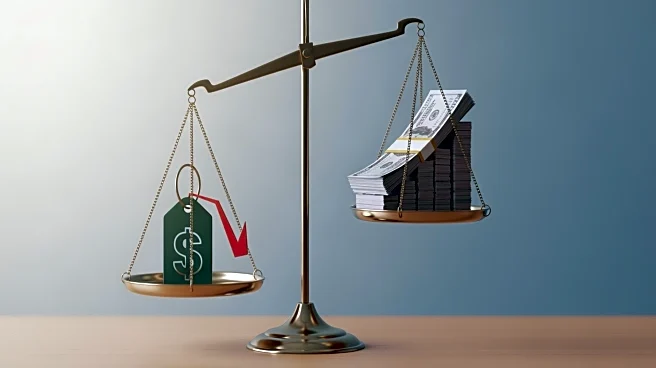What's Happening?
Despite a decrease in wholesale power and gas prices, UK households are experiencing rising energy bills due to higher network charges and policy costs. The UK government is under pressure to justify these
increases as it seeks funding for the clean-energy transition. Chancellor Rachel Reeves is preparing a budget that may include tax hikes, while energy consultancy Cornwall Insight predicts further bill increases by April. The government argues that expanding renewables will eventually lower costs, but the upfront transition expenses are currently burdening consumers. Octopus Energy warns that bills could rise by 20% in the coming years, even if wholesale prices drop.
Why It's Important?
The situation highlights the financial strain on UK households amid efforts to transition to renewable energy. The government's strategy to shift from gas to renewables is crucial for long-term sustainability and energy independence. However, the immediate impact on consumers is significant, with rising costs potentially affecting public support for the transition. The need for substantial investment in infrastructure, such as network upgrades, further complicates the issue. The balance between short-term consumer costs and long-term benefits remains a critical challenge for policymakers.
What's Next?
Chancellor Reeves is expected to announce measures to alleviate the financial burden on consumers in her upcoming budget. Potential adjustments to tax and climate levies are being considered to make energy bills more affordable. The government aims to ensure that any changes are progressive, benefiting those most in need. Meanwhile, the energy regulator Ofgem is set to approve new spending plans for grid operators, which could further impact bills. The focus will be on balancing investment in renewables with consumer affordability.
Beyond the Headlines
The transition to renewable energy is part of a broader effort to decarbonize the economy and reduce reliance on fossil fuels. The challenge lies in managing the economic and social implications of this shift, including the impact on energy prices and household budgets. The situation in the UK reflects similar challenges faced by other European countries, emphasizing the need for coordinated policies and investments to achieve sustainable energy goals.











